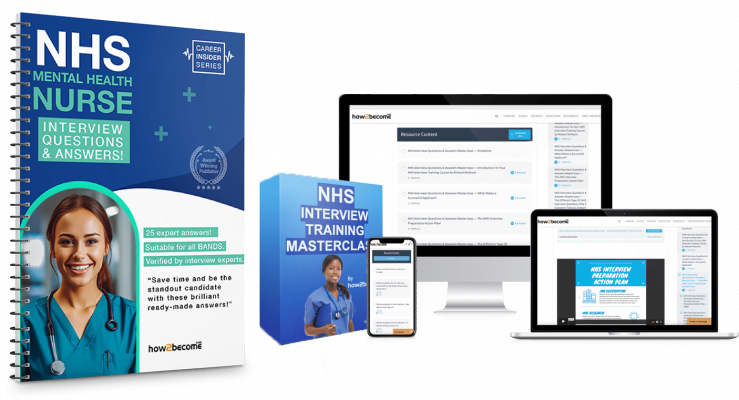Do you want to work as a mental health nurse for the NHS and have an interview coming up? Congratulations on taking this important step toward a career that will be rewarding and make a difference. It’s important to be well-prepared and sure of yourself as you prepare for your NHS mental health nurse interview. In this guide, we’ll show you how to answer common interview questions and understand the role of a mental health nurse, as well as share some essential tips to give you the edge!
Regardless of the band, you will need to complete a comprehensive interview that is designed to assess your suitability for the role. As a mental health nurse, you could be applying for any of the following bands:
- NHS Band 2
- NHS Band 3
- NHS Band 4
- NHS Band 5
- NHS Band 6
- NHS Band 7
- NHS Band 8
UNLOCK THE NHS MENTAL HEALTH NURSE INTERVIEW QUESTIONS AND ANSWERS + GET THE NHS ONLINE INTERVIEW MASTERCLASS COURSE FOR FREE!

- 25 expertly written answers to the toughest NHS interview questions.
- Get the edge over other candidates.
- Don’t waste time wondering what to say – ensure you are including what the interviewers want to hear to make your interview successful.
- Instant access to all of the answers so you can prepare for your NHS interview fast!
- PLUS… get a 14-day free trial to our bestselling Online NHS Interview Masterclass to elevate your interview to a whole new level! (Thereafter just £27+vat per month, no minimum term. Cancel anytime).
SPECIAL OFFER £39.99 TODAY’S PRICE ONLY: £4.99
How Do I Prepare for an NHS Mental Health Nursing Interview?
1. Do research on the NHS and nursing for mental health: Start by learning as much as you can about the NHS and what a mental health nurse does within it. This will show that you are really interested in the job.
2. Take a look at your application and CV: Be ready to talk about your education, work experience, and any skills or certifications that you listed on your application that are relevant. Be ready to explain how these things have helped you get ready for the role.
3. Look over the job description: Carefully look over the job description and requirements. This will help you make sure your answers match what the interviewers want in a candidate.
4. Get to know what the NHS values: The NHS is based on a set of core values, such as kindness, respect, and dedication. Be ready to give examples of how you show these values in how you treat patients and coworkers.
5. Practice answering these typical interview questions: Practice answering both general and questions about mental health nursing that might come up in an interview. This will help you come up with answers that are clear and well-thought-out during the actual interview.
6. Make a list of questions to ask: Interviews work both ways. Prepare some thoughtful questions to ask the interviewers about the role, the team, and the challenges and opportunities in the department.
What Should I Say in an NHS Mental Health Nurse Interview?
During your interview, you should focus on showing how qualified, experienced, and interested you are in mental health nursing. Here are a few important things to talk about:
1. Your Qualifications: Talk about your education, certifications, and any other training that has prepared you for the role.
2. Practical Experience: Showcase your mental health nursing experience, whether it’s from school, an internship, or a job you had before.
3. Patient-Centered Care: Make it clear that you are committed to giving patients all-around care and a safe, supportive environment.
4. Effective Communication: Talk about how well you can talk to patients, their families, and your coworkers, given how sensitive mental health issues can be.
5. Skills for solving problems: Share examples of how you’ve dealt with difficult situations or crises, showing that you can think on your feet and take the right steps.
6. Teamwork: Talk about your experience working in multidisciplinary teams and how you add to the overall care plan for a patient.
What NHS Mental Health Nurse Interview Questions Get Asked?
There are many different kinds of interview questions, but here are a few common ones you might be asked:
Q. Why do you want to be a mental health nurse?
Q. How will you make sure to look after your own well-being as a mental health nurse?
Q. Why do you want to work for the NHS?
Q. A patient requiring mental health treatment is being discharged. However, their partner speaks to you in private and tells you they don’t know what to do when they go home together. What would you tell them?
Q. What are the most important values in mental health and which, in your opinion, is the most important?
Q. What skills and qualities are needed to work in mental health?
Q. What experience do you have within the Mental Health sector?
Q. Tell me a time when you worked with other people within a healthcare team to provide excellent patient or client care?
Q. Explain a situation you were in when you helped to improve people’s lives?
Q. Why should we choose you over the other candidates?
Q. What challenges are we facing right now within the mental health sector?
Q. Talk me through the steps you would follow when dealing an upset or confused patient or client who was in your care?
Q. What are the six NHS Values and what is their purpose?
Q. What does a COMMITMENT TO QUALITY OF CARE mean to you and how would you go about demonstrating it in this NHS role?
Q. Describe a time when you provided treatment or care which was focused on one of the six NHS values?
What Is the Role of a Mental Health Nurse?
By fully understanding the role of an NHS mental health nurse, you can answer the interview questions better as you can make sure to give examples of each task and skill required.
Mental health nurses are an important part of the healthcare system because they help people with mental health problems by giving them specialised care and support. Among their duties are the following:
1. Assessing Patients: Doing thorough evaluations of patients’ mental health and making care plans that are right for them.
2. Medication Management: This means giving and keeping an eye on medications as doctors order.
3. Therapeutic Interventions: Giving the patient and their family counselling, therapy, and support.
4. Crisis Intervention: This means responding to dangerous situations and calming them down before they get worse.
5. Advocacy: Speaking up for the needs and rights of patients within the healthcare system.
6. Education: Teaching patients and their families about mental health problems, different ways to treat them, and ways to deal with them.
In conclusion, getting ready for an interview to be a mental health nurse for the NHS requires research, practice, and self-confidence. By knowing what the job entails, showing off your qualifications, and knowing how to answer common interview questions, you’ll be ready to ace your interview and start a rewarding career as a mental health nurse in the NHS. Remember that your genuine desire to help people and make a difference in their health will shine through during your interview.
UNLOCK THE NHS MENTAL HEALTH NURSE INTERVIEW QUESTIONS AND ANSWERS + GET THE NHS ONLINE INTERVIEW MASTERCLASS COURSE FOR FREE!

- 25 expertly written answers to the toughest NHS interview questions.
- Get the edge over other candidates.
- Don’t waste time wondering what to say – ensure you are including what the interviewers want to hear to make your interview successful.
- Instant access to all of the answers so you can prepare for your NHS interview fast!
- PLUS… get a 14-day free trial to our bestselling Online NHS Interview Masterclass to elevate your interview to a whole new level! (Thereafter just £27+vat per month, no minimum term. Cancel anytime).
SPECIAL OFFER £39.99 TODAY’S PRICE ONLY: £4.99
